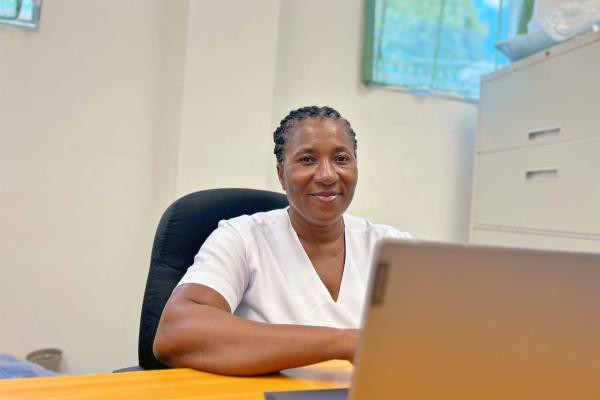In the mountains of the Central Plateau, in the commune of Boucan-Carré, there are few passable roads. This is where Marie Denise Saint Louis, a nurse for over 14 years, has chosen to serve. Originally from this commune, she knows the realities of the families she cares for. She sees them arrive early in the morning, after hours of walking, sometimes without having eaten, often without understanding what is happening to them. For her, caring means listening, explaining, and acting quickly with the means at hand.
A graduate of the Université Notre-Dame d’Haïti, she began practicing in 2008 at the Saint-Michel de Boucan-Carré health center, a Zanmi Lasante site. Now Director of Nursing, she oversees a team that she must train, support, and coordinate despite the constant challenges of a healthcare system under pressure.
“What drove me to become a nurse was the desire to help the most vulnerable. Here, we can’t make distinctions based on people’s means. All patients are entitled to the same quality of care.”
Among the hundreds of cases she has taken on, one in particular remains etched in her memory. A woman arrived in the emergency department after a home birth, hemorrhaging. Her condition was critical: low blood pressure, weak pulse, and falling temperature. Marie Denise immediately set up a venous line, performed a uterine revision, and administered the necessary medication. The diagnosis: placental debris and moderate anemia. Thanks to rapid management, the patient was able to pull through.
“That day, I really understood the difference a well-trained, attentive and responsive nurse can make. It’s this kind of intervention that still motivates me today.”
To be a nurse at Boucan-Carré means having to do more with less. There aren’t enough staff to cover continuous shifts. Equipment is often in short supply. And in a context where certain illnesses are still perceived as punishments, convincing patients to stay in hospital or undergo treatment is sometimes a cultural challenge.
To cope, Marie Denise relies on pedagogy and dialogue. She organizes health education sessions, trains young nurses in empathetic communication, and optimizes the use of scarce resources between several departments.
“We can’t change the system overnight. But we can build trust. And every time a patient understands what they have, it’s already a victory.”
What Marie Denise wants for the community of Boucan-Carré is a healthcare system that reflects the real needs of the inhabitants. A system supported by well-trained, well-treated carers who remain committed despite the difficult conditions. And above all, a better-informed population, capable of distinguishing beliefs from medical realities.
“Prevention is key. I encourage all patients to listen to professionals, not to be afraid of hospitals. When you understand what you have, you can take care of yourself. When we believe that everything is supernatural, we expose ourselves unnecessarily.”
Training, supervising, and equipping these women and men means guaranteeing real access to care, even in the most remote areas. Support healthcare in Haiti and help caregivers like Marie Denise continue their mission.
